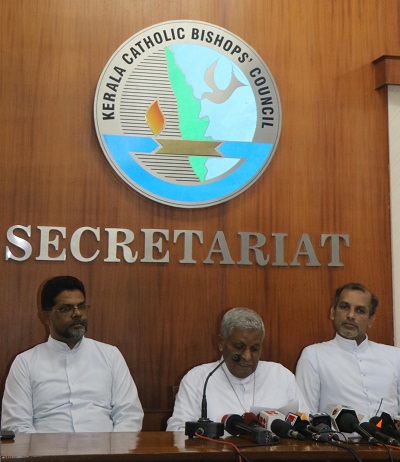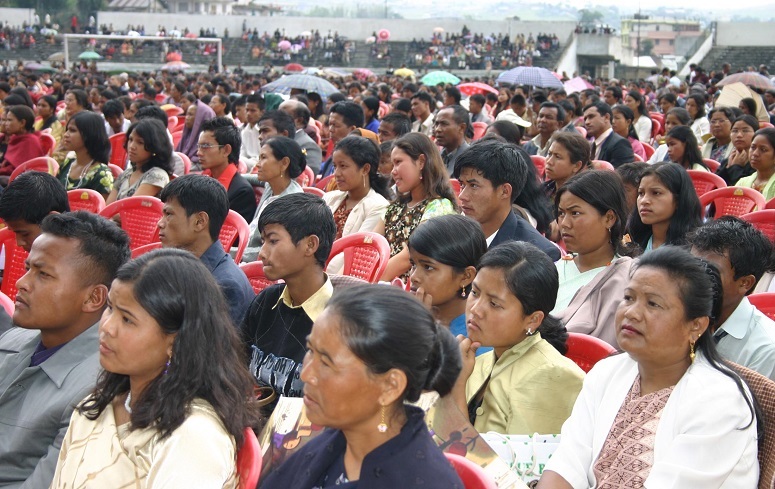The leaders of India’s Christian minority – 2.3 per cent of India’s 1.3 billion population – have distanced themselves from rumours of increasingly close ties with the ruling Hindu nationalist BJP.

The latest rumours began following a meeting between senior Catholic Church leaders and the BJP’s national president, Amit Shah, in the south Indian Christian stronghold of Kerala, from 2-4 June.
But the president of the Kerala Catholic Bishops’ Council, Archbishop Soosa Pakiam, said the two sides had fundamentally different outlooks.
“We cannot accept their basic ideology. We have serious concerns and apprehension about some of the steps they have taken,” the Archbishop said at a news conference on 8 June.
“We did not go to meet Amit Shah. When a prominent leader came with a request to meet us, we entertained him.”
“We cannot accept their basic ideology.”
Archbishop Soosa Pakiam
Beef ban leads to resignations
Archbishop Pakiam, head of Kerala’s over-five-million-strong Catholic Church, added that he and his colleagues stood against the BJP on its recent ban on the sale of cattle (seen as sacred by Hindus) for slaughter.
The ruling, on 23 May, applies across the nation, including in traditionally beef-eating states like Kerala and the north-east, where many Christians live.
“We will never accept a dictum on what we should eat or do,” the Archbishop said. “Whatever they [the BJP] may try to impose, using the power they have, we are not going to follow such decrees.”
“For us, the constitution is supreme,” he added, a reference to the constitution’s protection on individual freedoms – nothing is mentioned in the constitution about prohibiting particular foods.
Several Christian members of the BJP resigned from their posts in the wake of the ruling, which is being challenged in the Supreme Court, including Bernard Marak from the majority-Christian state of Meghalaya in the north-east.

BJP ‘wants to woo Christians’
A statement by the Baptist Church Council in neighbouring Nagaland state – where 88 per cent of the population are Christian, according to the 2011 census – said the BJP’s “disappointment [at the] Church in defending her own faith” “stands contrary” to the BJP’s own claims about safeguarding the Christian faith.
The statement said that there was “little doubt” the BJP aims to “suppress the [Christian] minority of their religio-socio-cultural practices” and make them “feel insecure”.
It also said that some of the steps taken by the BJP government, which came into power in May 2014, have “affected Christians in particular”, referencing Modi’s 2015 move to turn Christmas Day into ‘Good Governance Day‘ and then, this year, turning Good Friday into ‘Digital India Day‘.
There were strong protests in the north-east following the announcement of the latter, after which Modi exempted the three Christian-majority states of the north-east from holding the event on Good Friday.
“The emerging trends are very worrying. There is certainly a concerted effort by the Hindu nationalists to make inroads into the Christian community.”
Rev Solomon Rongpi
“The promise that the BJP made to safeguard the Christian faith is a mere political statement,” Rev Zelhou Keyho, the President of the Nagaland Baptist Church Council, told World Watch Monitor. “They want to woo Christians into the party.”
Rev Keyho added that some members of the BJP in Nagaland had “expressed shock and unhappiness that some speakers in churches had spoken about their doubts of the secular credentials of the BJP from the pulpits”. (In India, the word “secular” is often used to express the need for an equal respect for all religions.)
“We cannot guess what is their plan for the region,” he said. “We cannot just wait for to experience what they are going to do in the north-east. We have seen what they have done in other parts of the country. If we wait, it may be too late. That is why we have made this statement.”
“The emerging trends are very worrying,” Rev Solomon Rongpi, general secretary of the Council of Baptist Churches of North East India, told World Watch Monitor. “There is certainly a concerted effort by the Hindu nationalists to make inroads into the Christian community.”
Rev Laldawngliana, moderator of the Synod of the Presbyterian Church of India, which has a significant presence in the north-east, told World Watch Monitor that several BJP legislators elected in March in his home state of Manipur – also in the north-east – are from the Christian community. Some of them defected from other parties, handing the BJP a majority, even though the party initially won fewer seats than the rival Congress Party.
“All sorts of methods are being used in the north-east to make the BJP acceptable to Christians,” Laldawngliana explained.